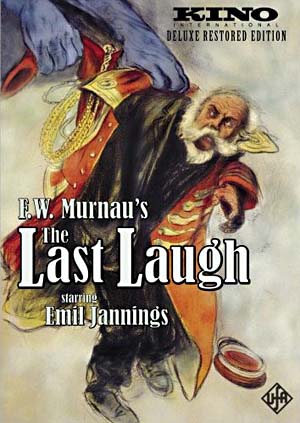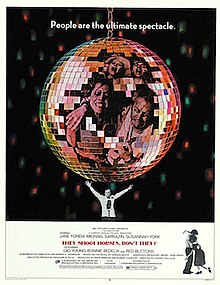5 Depressing movies you've probably never heard of
In the words of Mel Brooks: "Life Stinks!" We all go through so much BS in our daily lives that it’s a miracle we an endure any of it. But for thick and thin, society created methods to escape the cruel pangs of life and find some comfort in it; meditation, religion, reading and, of course, cinema. Cinema, in the past century, has become a staple-mark of an American industry that allowed people to escape into the world the movie creates. But no matter how hard you try to escape from reality, reality always finds a way to catch up with you and with reality calling, filmmakers have created movies to remind audiences that we can’t ignore reality and instead of trying to escape from it, we have to confront it. But why settle for sad movies everybody already knows, like “Old Yeller" or “Million Dollar Baby," when I can delve into the catacombs of cinematic history and pull out the unheard and the obscure. Let’s go really hipster today and list down five movies that, you’ve probably never heard of.
1. Bicycle Thieves (1948)
The headliner for the Italian Neorealism era, an era of filmmaking that came after World War II where Italian cinema dispensed with the hard truth of their suffering after the War. Leading this movement was Vittorio De Sica, who broke ground by employing non-professional actors to cement the element of everyday life to the average audience. The movie follows a man who sells his bedsheets to reclaim his bicycle to acquire a job putting up posters around the city so he can feed his family, but that all changes when a thief runs off with his bicycle. The rest of the movie is the man and his young son searching the city for his bicycle, running into dead ends, even being desperate enough to steal a bicycle. I wish I could tell you there was a happy ending, but regretfully, there isn't. He holds his son's hand and walks into a crowd, almost resigned to their fate as the father is ashamed to have been a terrible example to his son.
2. Ikiru (1952)
Any self-respecting film-maker will likely explain in great detail Akira Kurosawa and his achievements in cinema and the major influence his films have on modern day cinema. He is widely known for his samurai-era films, but his contemporary dramas also hold equal power to the movie-goer looking for a little bit more outside the Hollywood system. "Ikiru" follows the story of Kanji Wantanabe (Takashi Shimura), an elderly businessman whose life is forever changed when he learns he has stomach cancer, sending him into a deep depression. Wishing to make his final moments mean something, he works to convince a bureaucratic board to turn a filth-ridden cesspool into a playground for children. The big tear-jerker scene moment for this movie nears the end where Kanji's co-workers discuss the events leading up to his death, pondering if he knew he was going to die or if this caught him off-guard. A police officer arrives telling them of the last time he saw Kanji alive, he swinging on a swingset, snow falling around him as he sings 'Gonolda No Uta.' Even though the co-workers make a vow to be more open and confrontational as Kanji was, the next day, each and every one of them find they simply lack the courage to speak up for the common man. The late Roger Ebert once wrote of this movie "…and the older I get, the less Wantanabe seems like a pathetic old man, and the more he seems like every one of us." In many ways, there is a Kanji Wantanabe in all of us, wanting to speak up against the higher authority.
3. Der Letzte Mann ("The Last Laugh") (1924)
Here's one that's so depressing, American distributors demanded the filmmaker make an alternative happy ending just to show it overseas. Emil Jannings, the first man to receive the Academy Award for Best Actor in 1929, stars as an aged hotel doorman, a position that has deep respect in his poor German neighborhood, especially with his daughter getting married recently. But his life is turned upside down when he is demoted by the hotel manager to a bathroom attendant and he tries to hide his demotion from his family and friends. Eventually, the truth comes out and instead of support, he is mocked and ridiculed out of his home and forced to sleep in the bathroom of the hotel he works at, the only kindness he is shown from a nightwatchman who puts his coat over him as he sleeps. What made this film in particular as being unique was the lack of intertitles that identified the Silent Movie era of the time, but honestly, I feel this makes the movie better for it, with the lack of title cards, it allows the actors to tell the story for you and this allows the viewer to form what is being said in their mind. As I said before, the movie's depressing ending forced the filmmaker to make an alternative ending, the only title card in this movie, where the movie has to tell you that "the author decided to give the old man a happy ending" as this incredibly tacked-on ending explaining that this millionaire gave all his money to a guy he met in a bathroom. While that ending definitely fits the English title "The Last Laugh," the movie's true ending is so saddening that i shows much more emotional bravados than what America showed in 1925. For anyone who is curious, you can see the full movie on Netflix.
4. They Shoot Horses, Don't They? (1969)
In the modern era, someone would probably name this movie as "What Will You Do For A Klondike Bar?" But in the time the movie is set, the title is all too appropriate for this downer of a movie. In the 1930s, money was scare because of the Great Depression, everyone needed work to get money to pay for food. Directed by Sydney Pollack, the movie shows a group of couples who compete in a dance competition for $1500, each character we're meant to care about is established and we are told why they need the money. But the real shock in the ending comes with this twist that, I won't spoil, but it'll make you very angry, which, considering the kind of movies Sydney Pollack made in his life, that was his intention. Get mad. Get very mad. But then get sad at the end where the last main character we felt bad for is given no happy ending for his choices as the marathon continues with couples still dance away, hoping to win something to keep them alive.
5. When the Wind Blows (1986)
You'd probably expect of me to include "Grave of the Fireflies" or some Japanese anime, but I'm choosing movies that you wouldn't have heard of and for this sort of movie, you wouldn't exactly see it as depressing until the ending. Released during a time of the fear of nuclear war, "When the Wind Blows" tells the tale of an elderly couple that prepares their home for nuclear war and their subsequent survival after the bomb's blast. Just like the TV movie "The Day After," "When the Wind Blows" capsulated the paranoia of radiation fallout during the 1980's while Ronald Reagan was in office and his threats to nuke the Russians scared everyone stiff. This movie takes us through an animated journey of this post-World War II English couple try to survive and keep positive after the nuclear bomb, sadly their greatest failing is their lack of understanding radiation and as they begin to feel the effects of radiation poisoning, the old man tries to keep positive and find a rational explanation for all the things happening to them. "The Powers that be will no doubt take care of us…" Though I will admit, David Bowie's theme song and Roger Waters' score does distract slightly from the movie's feel, I can't hep but admire this movie for being so ballsy to show these two suffering and yet they try to keep a positive attitude through it all. While "Grave of the Fireflies" is very, very depressing, this one is a rare time capsule that shows the UK's viewpoint of the possibility of nuclear fallout.






No comments:
Post a Comment